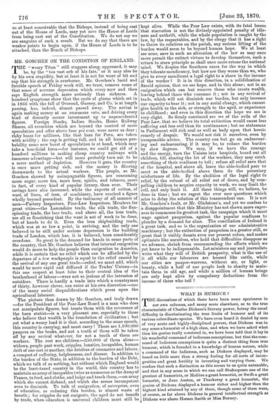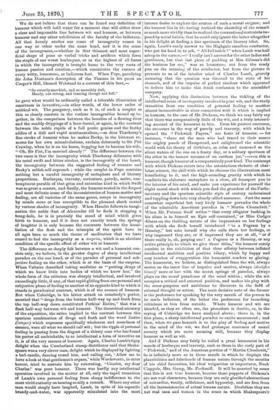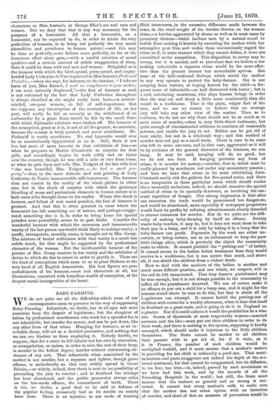WHAT IS HUMOUR ? T HE discussions of which there have
been some specimens in our own columns, and many more elsewhere, as to the true characteristic of Charles Dickens's literary power, betray the usual difficulty in discriminating the true limits of humour and of its various subordinate species. We have even heard it denied by men of very acute and highly-disciplined powers, that Dickens was in any sense a humorist of a high class, and when we have asked what then his genius really consisted in, we have been told that it lay in his wonderful command of ludicrous conceptions, but that the com- mand of ludicrous conceptions is quite a distinct thing from true humour, which is founded in a knowledge of human nature, while a command of the ludicrous, such as Dickens displayed, may be based on little more than a strong feeling for all sorts of incon- gruities and great fertility in inventing and varying them. We confess that such a distinction as this seems to us quite untenable, and that in any sense in which we can call Shakespeare one of the greatest of humorists, or Moliere a great humorist, or Swift a great humorist, or Jane Austen, or Thackeray a great humorist, the genius of Dickens displayed a humour richer and higher than the highest kind attained by any of those, though some of them were, of course, as far above Dickens in general intellectual strength as Dickens was above Horace Smith or Miss Burney. We do not believe that there can be found any definition of humour which will hold water for a moment that will either draw a clear and impassable line between wit and humour, or between humour and any other subdivision of the faculty of the ludicrous. All that keenly excites our sense of incongruity comes in one way or other under the same head, and it is the sense of the incongruous,—whether in that thinnest and most super- ficial shape of puns or verbal tricks and artifices which form the staple of onr worst burlesques, or in the highest of all forms in which the incongruity is brought home to the very roots of human passion and emotion,—which constitutes the essence of every witty, humorous, or ludicrous feat. When Pope, parodying Sir John Denham's description of the Thames in his poem on Cooper's Hill, likened Welstead to a current of thin beer,— "So sweetly mawkish, and so smoothly dull, Heady, not strong, and foaming though not full,"
he gave what would be ordinarily called a tolerable illustration of smartness in invective,—in other words, of the lower order of satirical wit. The pungency, such as it is, of such a couplet as this as clearly consists in the various incongruities bound up to- gether, in the comparison between the beauties of a flowing river and the muddy drippings of a beer-barrel, or again, in the contrast between the noble rapids of a full poetic genius and the frothy eddies of a dull and vapid sentimentalism,—as does Thackeray's fine stroke of humour when he makes Becky, in the bitterest re- morse for her own miscalculations, exclaim dolorously to Sir Pitt Crawley, when he is on his knees, begging her to become his wife, " Oh, Sir Pitt, I'm married already !" The difference between the two cases is that the incongruity which Thackeray delineates with his usual swift and bitter strokes, is the incongruity of the heart, the incongruity between the suggested feeling of remorse and Becky's selfish self-reproach ; while the couplet in Pope contains nothing but a careful incongruity of metaphors and of literary proportions. Burlesque, travesty, caricature, parody, satire, con- temptuous parable of that grim and saturnine kind in which Swift was so great a master, and finally, the humour rooted in the deepest and most delicate sense of the inconsistencies of human motive and feeling, are all varieties of the same genus, essays in incongruity by minds more or less susceptible to the pleasant shock caused by various shades of incongruity. When Hamlet follows in imagi-
nation the noble dust of Alexander till he finds it stopping a bung-hole, he is in precisely the mood of mind which gives birth to humour, and if it does not exactly touch the springs of laughter it is only because the contrasts between the humi- liation of the flesh and the triumphs of the spirit have in- all ages been so much the theme of meditation that we have ceased to feel the incongruity as a surprise, which is an absolute condition of the specific effect of either wit or humour.
The difference so deeply felt between a wit and a humorist con- sists only, we believe, in the greater degree of sharp intellectual paradox on the one hand, or of the paradox of personal and sub- jective feeling on the other, which is at the basis of the surprise. When Voltaire described taking medicine as "putting drugs of which we know little into bodies of which we know less," the whole form of the criticism was sharply intellectual, and involved exceedingly little, if any, of that rapid gliding from one personal and subjective phase of feeling to another of an opposite kind to which it stands in paradoxical contrast, which is of the essence of humour. But when Coleridge, in his bitter attack on somebody's porter,
asserted that " dregs from the bottom half-way up and froth from the top half-way down constituted Perkins' Entire," that was a flash half-way between wit and humour. The theoretical accuracy of the exposition, the satire implied in the contrast between this spurious combination of dregs and froth and the word Entire (integer) which expresses specifically wholeness and soundness of essence, were all what we should call wit ; but the ripple of personal feeling in passing from the disgust of a thirsty man who has found his porter all undrinkable, to so intellectual a form of invective on it, is of the very essence of humour. Again, Charles Lamb's tipsy delight when the Cumberland stamp-distributor said that Shake- speare was a very clever man, delight which he displayed by lighting a bed-candle, dancing round him, and calling out, ' Allow me to have a look at that gentleman's organs,' while Wordsworth, in utter horror, tried to restrain him by reiterating, ' Charles, my dear Charles!' was pure humour. There was hardly any intellectual operation involved in the matter at all, only the rapid transition of Lamb's own personal feeling from sleepy indifference to the most vivid curiosity on hearing so silly a remark. Where any other man would simply have laughed, Lamb, in spite of his soporific brandy-and-water, was apparently stimulated into the most
intense desire to explore the sources of such a moral enigma ; and the humour lies in his having realized the absurdity of the remark so much more vividly than he realized the conventional restraints im- posed by social habits, that he could only ignore the latter altogether in his delight at finding a fine specimen of the literary idiot. So, again, Lamb's ready answer to the Highgate omnibus conductor, who put his head in to ask, " All full inside ?" when Lamb was half asleep in the corner,—" I really can't answer for the other ladies and gentlemen, but that last piece of pudding at Mrs. Gilman's did the business for me," was so humorous, not from the ready pun on the meaning of the conductor, but from the picture it presents to us of the interior mind of Charles Lamb, gravely assuming that the question was directed to the state of his stomach, and of the impulse of perfect candour which appeared to induce him to make this frank confession to the assembled company.
Now, applying this distinction between the tickling of the intellectual sense of incongruity involved in pure wit, and the ready transition from one condition of personal feeling to another almost inconceivable in close connection with it which is implied in humour, to the case of Mr. Dickens, we think we may fairly say that there was comparatively little of the wit, and a truly astound- ing amount of the humorist in him. Even his poorest successes, the successes in the way of parody and travesty, with which he opened the " Pickwick Papers," are feats of humour, — for instance, " there sat the man who had traced to their source the mighty ponds of Hampstead, and enlightened the scientific world with his theory of tittlebats, as calm and unmoved as the silent waters of the one on a frosty day, or a solitary specimen of the other iu the inmost recesses of an earthen jar,"—even this is humour, though humour of a comparatively poor kind. The contempt with which Dickens enters into the ostentatious rhetoric of char- latan science, the skill with which he chooses the illustrations most humiliating to it, and the high-sounding gravity with which he conducts his elaborate metaphors to a close, all transport you to the interior of his mind, and make you experience for yourself the slight moral shock with which you find the grandeur of the Parlia- mentary and the spurious scientific style of oratory undermined and toppling down into very closely-allied nonsense. Just the same somewhat superficial but very lively humour pervades the whole of the admirable American parodies in " Martin Chuzzelwit." When Mr. Putnam Smif writes " that every alligator basking in his slime is in himself an Epic self-contained," or Misa Codger dilates on the thrilling nature of the impressions on her feelings with which she finds herself introduced " to a Pogratn by a Hominy," but asks herself why she calls them her feelings, or why impressed they are, or if impressed they are at all, "or if there really is, oh, gasping one ! a Pograin or a Hominy, or any active principle to which we give those titles," the humour surely consists in the exhibition of that close affinity between inflated intellectual ambition and positive idiocy, which by happy and easy touches of exaggeration the humourist renders so glaring. The humourist, we believe, as distinguished from the wit, always moves on the inner line of impulse and motive, always idents himself more or less with the secret springs of paradox, always plays on the moral paradoxes of the mind within ; while the wit occupies a critical and external position, and makes his play with the cross-purposes and antitheses he discovers in the field of external thought or action. The most decisive note of the former is the preference for speaking by the very mouth of the person to be made ludicrous, of the latter the preference for launching criticisms at him from outside. Where humour and wit are blended, as they so often are, the procedure is double, as, in the saying of Coleridge we have analyzed above ; there is, in the first place, a sharp intellectual paradox to excite amusement ; and then, when we pass beneath it to the play of feeling and motive in the mind of the wit, we find grotesque contrasts of moral scenery which are more amusing still, because they display humour as well as wit.
And if Dickens may fairly be called a great humourist in his moods of burlesque and travesty, such as those in the early part of " Pickwick," and of the American portion of " Martin Chuzlewit," he is infinitely more so in those moods in which he displays the plausibilities and falsehoods of human nature through the mouths of his chief favourites, his ideal vulgarities or impostures, Noah Claypole, Mrs. Gamp, Mr. Pecksniff. It will be asserted by some that this is not true humour, because these puppets of Dickens's are not real characters, because they are only glorified abstractions of cowardice, vanity, selfishness, and hypocrisy, and are free from all the inconsistencies of actual human nature. Doubtless they are not real men and women in the sense in which Shakespeare's characters, or Miss Austen's, or George Eliot's are real men and women. But we deny that that is any way necessary for the purposes of a humourist. All that a humourist, as a humourist, can be expected to do, in order to attain the very perfection of humour, is to bring out perfectly the true moral absurdities and paradoxes in human nature ; —and this may be done as perfectly,—we believe more perfectly, so far as the humorous effect alone goes,—with a careful selection of moral qualities and a certain amount of subtle exaggeration of them, than it could be done with real men and women. Delightful as is the humour with which the birth-proud, purse-proud, and empty- headed Lady Catherine de Vere is painted in Miss Austen's Pride and Prejudice,—when she says, for instance, to the heroine, " I take no leave of you, Miss Bennet, I send no compliments to your mother, I am most seriously displeased,"—the feat of humour as such is not enhanced by the fact that Lady Catherine throughout is always sketched as she might really have been,—a narrow- minded, arrogant woman, so full of self-importance that she supposes any interruption of the courtesies of life, on her part, will really be felt as severely as the withdrawal of an ambassador by a great State would be felt by the small State with which diplomatic relations were broken off. The humour of the conception, great as it is, is not at all the greater, we maintain, because the woman is truly painted, and never overdrawn. Mr. Peckeniff is vastly overdrawn. No real hypocrite would ever be so ostentatiously hypocritical as he is. Still, there is not less but more of mere humour in that exhibition of him—as when he proposes to Martin Chuzzlewit to surprise his dear girls, and accordingly begins to walk softly and on tiptoe over the country, though he was still a mile or two from home, or when he gets tipsy and tells Mrs. Todgers of his late wife that " she was beautiful, Mrs. Todgers, — she had a small pro- perty,"—than in the more delicate and real painting of Lady Catherine de Vere's immeasurable self-importance. The humour does not consist in the reality of the whole picture in either case, but in the shock of surprise with which the grotesque blending of mean and pretentious elements in human nature is in both cases alike brought home to the reader. Where this shock is keenest, and fullest of real moral paradox, the feat of humour is greatest. And that this is often greatest in cases where the humourist has left something out of nature, and perhaps exagge- rated something else in it, in order to bring home his special paradox more powerfully, seems to us past doubt. Consider the wonderful humour with which the enormous and immeasurable vanity of the last person one would think likely to indulge vanity, a snuffy, intemperate, monthly nurse, is brought out in Mrs. Gamp. The mixture of brutal selfishness with that vanity is a much less subtle touch, for that might be suggested by the professional character of the woman. But the inexhaustible humour of the picture of Mrs. Gamp consists in her vanity and the subtleties of device to which she has to resort in order to gratify it. These are the kind of conceptions which seem to us to place Dickens at the very head of all English humourists. His best figures are pure embodiments of his humour,—not real characters at all, but illustrations, conceived with boundless wealth of conception, of the deepest moral incongruities of the heart.






























 Previous page
Previous page